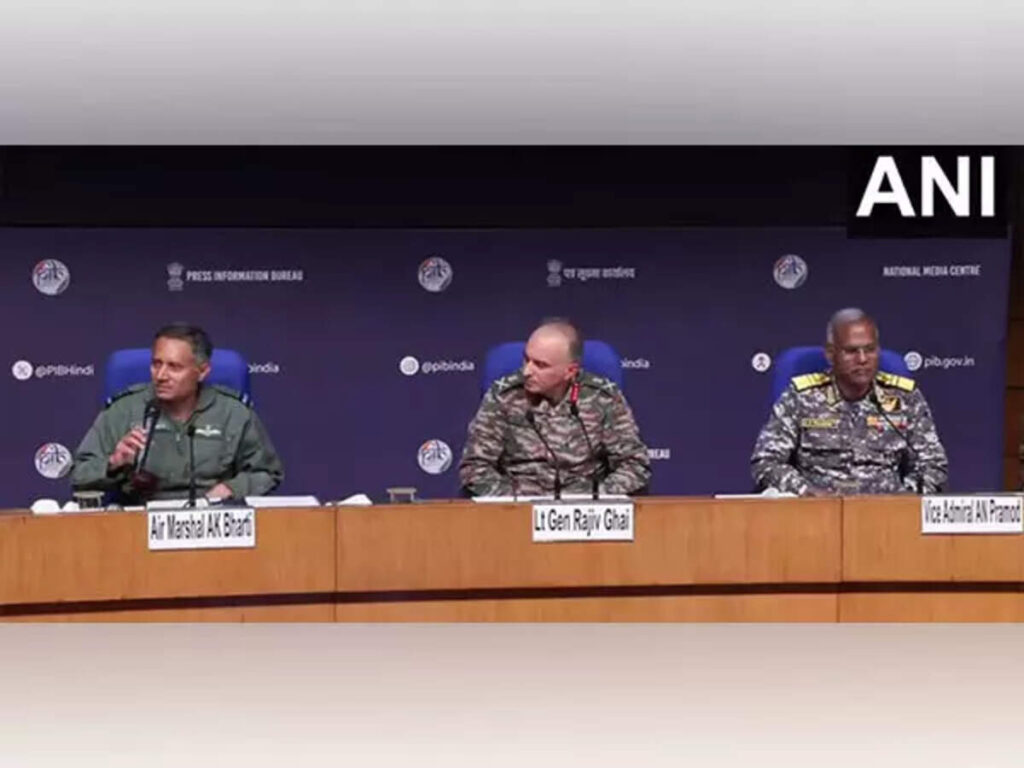NEW DELHI: India will never accept mediation on the Kashmir issue or discuss the matter, and the only item to talk about is Pakistan returning the portion of Kashmir that is in its illegal occupation, government sources on Sunday said in an off-the-record briefing.
Sources also said India had called Pakistan’s nuclear-deterrence bluff after retaliating against the Pahalgam terrorist attack.
“We take the nuclear threat seriously, but it cannot serve as cover for Pakistan to do terrorism in our country,” a top government official said.
Prime Minister Narendra Modi told the armed forces the artillery must respond to bullets from the other side (Wahan se goli chalegi, toh yahan se gola chalega), sources added.
On the other hand, Director General of Military Operations Lieutenant General Rajiv Ghai, Director General of Air Operations Air Marshal A K Bharti, and Director General of Naval Operations Vice-Admiral A N Pramod on Sunday revealed the details of Operation Sindoor, even as the tenuous understanding to stop all firing and military action on land, in the air, and at sea, arrived at between the militaries of the two countries on Saturday afternoon, held—despite violations by the Pakistani side just hours after the agreement came into effect on Saturday.
India said the Indian Air Force (IAF) pilots who took part in Operation Sindoor were back home, although the IAF did not provide a specific response to any loss of Indian aircraft. The armed forces did not deny losses but underscored that the aim of the operation had been achieved. Responding to a query on the possible loss of IAF aircraft in the operation and subsequent military exchanges with Pakistan, Bharti did not provide a specific response but maintained that all Indian pilots were back home. “We are in a combat scenario, and losses are a part of combat. The question you must ask us is: Have we achieved our objective of decimating the terrorist camps? And the answer is a thumping ‘yes’,” said Bharti.
He ended his answer by saying “all I can say is that we have achieved the objectives that we selected and all our pilots are back home”.
“If I comment on anything, it will only be an advantage for the adversary. We don’t want to give them any advantage at this stage.”
Responding to another media query, Bharti said the armed forces had successfully downed a few Pakistani aircraft. “Their planes were prevented from coming inside our border. So, we don’t have the wreckage with us. But we have definitely downed a few Pakistani planes. We would not like to hazard a guess on the numbers,” said Bharti. However, he added the IAF did have an estimate on the number of Pakistani planes shot down and was working to establish the number.
Ghai said over 100 terrorists were eliminated in the May 7 operation. He also said the nine terror camps targeted were identified after careful deliberations. He added that the Pakistan Army had lost between 35 and 40 soldiers between May 7 and 10 in the military exchanges.
Ghai also said the May 7 strikes killed “high-value targets”, such as Yusuf Azhar, Abdul Malik Rauf, and Mudassir Ahmad, who were involved in the hijacking of IC 814 in 1999 and the Pulwama attack in 2019, when 40 troopers of the Central Reserve Police Force were killed.
The Director General of Military Operations of Pakistan had called Ghai on Saturday afternoon, after which it was agreed between them that both sides would stop firing and military action on land, air, and sea with effect from 5 pm in India the same day. While instructions had been given on both sides to give effect to the understanding, violations on the Pakistani side occurred within hours.
“However, disappointingly, and should I add, expectedly, it took only a couple of hours for the Pakistan Army to violate these arrangements by cross-border and Line of Control firing, followed by drone intrusions across the expanse of the Western Front, through last night and in the early hours of the morning today. These violations were responded to robustly and dealt with as they must be,” said Ghai.
“We earlier today sent across a hotline message to the Pakistan DGMO, highlighting their violation of the understanding and our firm and clear intent to respond to these [violations] fiercely and punitively, if repeated tonight or later,” he underscored.
The Directors General of Military Operations are slated to talk again on Monday. The talks would go ahead as planned.
Ghai also said five armed forces personnel had been killed in the operations since May 7. “In the end, I pay my solemn homage to my five colleagues and brothers from the armed forces, and civilians who have tragically lost their lives in Operation Sindoor. Our hearts go out to the bereaved families and we express our solidarity with them…,” he said.
“We have thus far exercised immense restraint,” he added.
Pramod said after the Pahalgam terrorist attack, the navy’s Carrier Battle Group, surface forces, submarines, and aviation assets were immediately deployed at sea with full combat readiness.
“You may be aware that we tested and refined tactics and procedures at sea during multiple weapon firings in the Arabian Sea, within 96 hours of the terrorist attack. The aim was to revalidate our crew, armament, equipment and platform readiness to deliver various kinds of ordnance on selected targets precisely,” he said.
On Saturday evening, American President Donald Trump first announced the two South Asian neighbours had agreed to a “full and immediate ceasefire” after mediation by the United States (US). In his statement, US Secretary of State Marco Rubio said the governments of India and Pakistan “have agreed to an immediate ceasefire and to start talks on a broad set of issues at a neutral site”.
The Congress party on Sunday asked whether the government had accepted third-party mediation on Kashmir. Addressing a press conference at the party headquarters, Congress General Secretary Sachin Pilot said the “ceasefire” statements by Trump and Rubio were a surprise because this was the first time a third country had made announcements on behalf of India and Pakistan. He questioned America’s bid to “hyphenate” the two countries.
At a press conference, Pilot asked: “On what conditions has the ceasefire been declared? What is the guarantee that such things would not be repeated, as there is no credibility left after Saturday evening’s events (violations)? How can we believe them and what is the guarantee that such developments will not happen again.”
Congress leaders Rahul Gandhi and Mallikarjun Kharge, Leaders of the Opposition in the Lok Sabha and Rajya Sabha, respectively, in their respective letters to the Prime Minister, asked for another all-party meeting, this time chaired by Modi himself.
They also wanted a special session of Parliament.
Top government officials said talks with Pakistan would be only through the directors general of military operations.
They said the Indus Waters Treaty would be kept in abeyance as long as terrorism sponsored by Pakistan against India continued.
Sources said Operation Sindoor had not concluded.
At the height of the conflict, Modi told US Vice-President J D Vance that if Pakistan did anything, India’s response would be severe.
Earlier in the day, Defence Minister Rajnath Singh said that under Operation Sindoor, Indian armed forces not only struck Pakistani military bases near the border but their might was felt in Rawalpindi, where the headquarters of the Pakistan Army is located.
Source: Business Standard


 Bollywood Film Industry Is Facing Existential Crisis As Halls Footfalls Decline
Bollywood Film Industry Is Facing Existential Crisis As Halls Footfalls Decline 